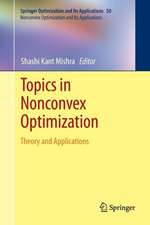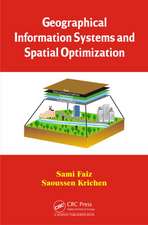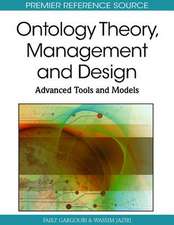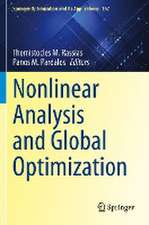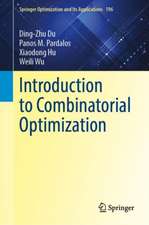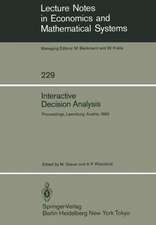Spatial Interaction Models: Facility Location Using Game Theory: Springer Optimization and Its Applications, cartea 118
Editat de Lina Mallozzi, Egidio D'Amato, Panos M. Pardalosen Limba Engleză Hardback – 13 apr 2017
| Toate formatele și edițiile | Preț | Express |
|---|---|---|
| Paperback (1) | 698.94 lei 6-8 săpt. | |
| Springer International Publishing – 8 mai 2018 | 698.94 lei 6-8 săpt. | |
| Hardback (1) | 705.34 lei 6-8 săpt. | |
| Springer International Publishing – 13 apr 2017 | 705.34 lei 6-8 săpt. |
Din seria Springer Optimization and Its Applications
- 15%
 Preț: 642.00 lei
Preț: 642.00 lei - 15%
 Preț: 664.61 lei
Preț: 664.61 lei - 18%
 Preț: 961.55 lei
Preț: 961.55 lei - 17%
 Preț: 360.79 lei
Preț: 360.79 lei - 13%
 Preț: 458.08 lei
Preț: 458.08 lei -
 Preț: 336.79 lei
Preț: 336.79 lei - 18%
 Preț: 787.91 lei
Preț: 787.91 lei - 17%
 Preț: 397.79 lei
Preț: 397.79 lei - 8%
 Preț: 337.37 lei
Preț: 337.37 lei - 18%
 Preț: 1133.30 lei
Preț: 1133.30 lei - 15%
 Preț: 646.43 lei
Preț: 646.43 lei - 15%
 Preț: 647.40 lei
Preț: 647.40 lei -
 Preț: 400.47 lei
Preț: 400.47 lei -
 Preț: 379.86 lei
Preț: 379.86 lei -
 Preț: 383.90 lei
Preț: 383.90 lei -
 Preț: 388.48 lei
Preț: 388.48 lei -
 Preț: 546.26 lei
Preț: 546.26 lei - 15%
 Preț: 647.40 lei
Preț: 647.40 lei -
 Preț: 390.25 lei
Preț: 390.25 lei - 15%
 Preț: 649.87 lei
Preț: 649.87 lei - 24%
 Preț: 611.55 lei
Preț: 611.55 lei - 18%
 Preț: 972.62 lei
Preț: 972.62 lei - 20%
 Preț: 585.91 lei
Preț: 585.91 lei - 15%
 Preț: 710.09 lei
Preț: 710.09 lei - 18%
 Preț: 742.61 lei
Preț: 742.61 lei - 15%
 Preț: 658.22 lei
Preț: 658.22 lei - 15%
 Preț: 659.02 lei
Preț: 659.02 lei - 18%
 Preț: 745.15 lei
Preț: 745.15 lei
Preț: 705.34 lei
Preț vechi: 829.80 lei
-15% Nou
Puncte Express: 1058
Preț estimativ în valută:
134.97€ • 141.20$ • 112.12£
134.97€ • 141.20$ • 112.12£
Carte tipărită la comandă
Livrare economică 03-17 aprilie
Preluare comenzi: 021 569.72.76
Specificații
ISBN-13: 9783319526539
ISBN-10: 3319526537
Pagini: 384
Ilustrații: X, 327 p. 42 illus., 14 illus. in color.
Dimensiuni: 155 x 235 x 21 mm
Greutate: 0.65 kg
Ediția:1st ed. 2017
Editura: Springer International Publishing
Colecția Springer
Seria Springer Optimization and Its Applications
Locul publicării:Cham, Switzerland
ISBN-10: 3319526537
Pagini: 384
Ilustrații: X, 327 p. 42 illus., 14 illus. in color.
Dimensiuni: 155 x 235 x 21 mm
Greutate: 0.65 kg
Ediția:1st ed. 2017
Editura: Springer International Publishing
Colecția Springer
Seria Springer Optimization and Its Applications
Locul publicării:Cham, Switzerland
Cuprins
Bilevel Models on the Competitive Facility Location Problem (N. Aras and H. Küçükaydın).- Partial Cooperation in Location Choice: Salop’s Model with Three Firms (S. Chakrabarti and R. Gilles).- A Class of Location Games with Type Dependent Facilities (I. Curiel).- Location methods and Nash equilibria for experimental design in astrophysics and aerospace engineering (E. Daniele, P. De Paolis, G. Luca Greco, A. d’Argenio).- Leader-Follower Models in Facility Location (T. Drezner and Z. Drezner).- Asymmetries in Competitive Location Models on the Line(H.A. Eiselt, V. Marianov).- Huff-like Stackelberg Location Problems on the Plane (J. Fernández, J. Redondo, P. Ortigosa and B.- Tóth).- A Game Theoretic Approach to an Emergency Units Location Problem (V. Fragnelli, S. Gagliardo and F. Gastaldi).- An Equilibrium-Econometric Analysis of Rental Housing Markets with Indivisibilities (M. Kaneko and T. Ito).- Large Spatial Competition (M. Núňez and Marco Scarsini).- FacilityLocation Situations and Related Games in Cooperation(O. Palancı and S.Z. Alparslan Gök).- Sequential Entry in Hotelling Model with Location Costs: A Three-Firm Case (S. Patrí and A. Sacco).- Nash equilibria in network facility location under delivered prices (B. Pelegrín, P. Fernández and M.D. García).- Sharing costs in some distinguished location problems (J. Puerto).
Textul de pe ultima copertă
Facility location theory develops the idea of locating one or more facilities by optimizing suitable criteria such as minimizing transportation cost, or capturing the largest market share. The contributions in this book focus an approach to facility location theory through game theoretical tools highlighting situations where a location decision is faced by several decision makers and leading to a game theoretical framework in non-cooperative and cooperative methods. Models and methods regarding the facility location via game theory are explored and applications are illustrated through economics, engineering, and physics. Mathematicians, engineers, economists and computer scientists working in theory, applications and computational aspects of facility location problems using game theory will find this book useful.
Caracteristici
Examines facility location theory through game theoretical tools Focuses on situations where the location decision is faced by several decision makers Surveys models and methods regarding facility location using game theory






